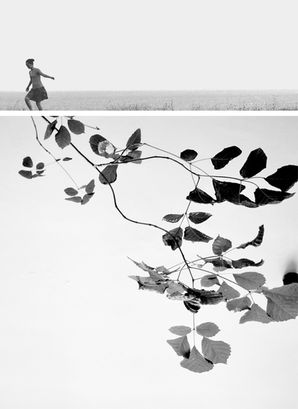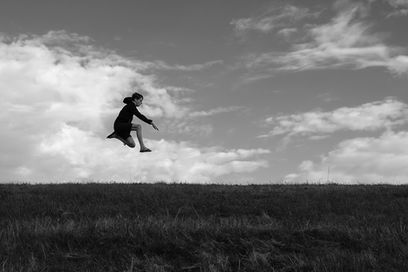
A MAN'S BEST FRIENDS
October 7, 2022
INTERVIEW
PHOTOGRAPHY Chetan Verma
INTERVIEW Melanie Meggs
For as long as he can remember, photography has been an undeniable force in Chetan Verma's life. From the days of his grandfather's film camera to the moments of discovery of street photography a decade later, the power of the lens to capture life in its many forms has been a constant source of wonder and inspiration.
Chetan's journey with photography has now taken him to a new stage, as he focuses his lens on one of the most ubiquitous street sights of India – the affable dog. Finding them pretty much everywhere on the streets in India, anyone documenting the streets are bound to encounter them. Chetan points out that, over the past several years, he has made great strides in his relationship with dogs, going from being initially terrified of them to making them the focal point in these pictures. Through his long term project Chetan has created a wonderful unexpected connection to an unexpected community.
As he shares his story and his photographs, we are invited to join Chetan on his journey of discovery – a journey that has led him to explore the beauty of life through the eyes of a camera, and to find moments of joy and connection in the most unlikely places.

“Street photography, to me, is fun. The fact that no moment can be repeated gives me the challenge of how to make that moment more interesting. It helps me to remember how life is full of so many interesting possibilities.”
IN CONVERSATION WITH CHETAN VERMA
THE PICTORIAL LIST: Welcome Chetan, please tell us about yourself.
CHETAN VERMA: I grew up in Mathura in the state of Uttar Pradesh, India. It's a small town but is well known throughout India and the world (if I may say that) as the birth place of Lord Krishna. Although I have been a student of science, I have always had good taste in music and arts in general. My aunt studied arts, and was deep into drawing and painting. My grandfather, who had retired as a doctor from the Army, was a great storyteller. And although I grew up in a large joint family, I was always his favorite and so he never stopped from playing with his film camera too occasionally. And though these things may seem small, I truly believe that all of this had a great impact on me and my taste in the arts in general.
At present I work as a Software Engineer with an Investment Bank in Gurgaon, India where I live with my lovely wife Pooja and our 11 year old daughter Aanya.
TPL: What drew you to photography? What was that moment that you decided to pick up a camera? Talk to us about your photographic experience on the streets of India.
CV: After I did my Master's in Computer Science, the next couple of years went by quickly - job, marriage and everything in-between. Then just after marriage, I got a chance to work in the United States for around 2 years. We were in our mid twenties, and so the idea was to visit as many places in the USA as possible and to save those memories, I bought a point-and-shoot camera. I captured some beautiful memories in the USA and we returned back to India in a couple of years. Then it was around 2016, the time of mid-life crisis for me, when those philosophical questions started to creep in my mind - what am I doing, how can I find happiness, what do I really love doing. And it was my wife who helped me find the answer - "Just pick your camera, go out, and shoot", she said.
And like a good husband, I followed her advice 😉. I came across some groups who would go out and shoot in Delhi, which is just an hour's drive from Gurgaon. The groups would mostly go to the historical monuments, and Delhi has so many of them. I am an introvert, so these photowalks helped me a lot to get confident walking with the camera and being able to shoot. Delhi is heavily populated so it's impossible to shoot without people getting in the frame. Even if this sounds unbelievable, trust me, this is true.
And so one walk turned to another, and soon I started getting comfortable going out solo. I was shooting everything - monuments, flowers, walls, people - you name it. Then one day I came across the gallery of Navin Vatsa on Instagram - I am sure it was that day when I really got hooked to this genre of street photography. I will talk more about this later as I can see there is a question further down that is more apt for talking about Navin's work.
TPL: When you take pictures, do you usually have a concept in mind of what you want to shoot, or do you let the images just "come to you", or is it both? Please describe your process.
CV: Street Photography is all about the moment, and so by its nature, it can't be planned. I go out with my camera with a clean mind, and then let my intuition guide me. If I see an interesting stage on the street, say light falling at a certain angle, or an interesting graffiti on the wall, and if I think a specific subject crossing my frame will make for an interesting moment, I do wait, but not for long. I prefer coming back to the same location next time rather than waiting for hours at a spot.
Having a concept in mind could be an interesting way to challenge oneself, but since I normally go out for photography only over the weeked, I do not have this luxury at the moment. I make the best of the time I get for photography.
TPL: What have been some of your most favorite places you find inspiration to explore through your photography, and what draws you there?
CV: What I absolutely love about Street Photography is that one doesn't need an 'ideal' location for it. Many great photographers have done amazing work simply documenting their neighbourhood.
Still, if I were to list some of my favourite places, Delhi would top the list, as that is where I live and so it is always accessible. Knowing a place helps, as you understand the dynamics of it - the more you visit a place, the more you know of when it's empty, when it is crowded, where and how will the light and shadow play, and so many other things that are quite important for Street Photography. It's a city in the mix, modernity of South Delhi and Gurgaon with their high rises and shopping malls, the narrow lanes of Old Delhi with its chaos, the banks of river Yamuna where at times you get a glimpse of a life full of peace.
Three years back I got a chance to visit London for work for 2 weeks, and so over the two weekends I explored whatever was humanly possible and fell in love with the art galleries and the streets.
TPL: What role has the digital community played in your photography journey thus far?
CV: If it's social media you are talking about, then I truly believe these platforms are simply tools - how you use them is up to you. You can use it to share your work with the whole world, get feedback, observe and learn how the master's shoot and so many other great things for improving your photography. I have been active on Instagram for a couple of years now and I personally like it a lot for the kind of reach it has. Of course there are some things I do not like about it - including the way it has started giving undue focus on video's and the promotional content, but I think the pro's weigh much more heavily against the con's at the moment for Instagram.
I don’t believe that one photograph is better than another; rather one is more interesting than another. So, basically, 'you get what you take'. If the objects in front of the camera are interesting enough ‘you take them’, and if they are not 'you make them'. - Obie Oberholzer

TPL: Do you have any favourite artists or photographers you would like to share with us, and the reason for their significance?
CV: Navin Vatsa would top the list for me. I consider him my Guru of sorts - in my initial days while I was new to Street Photography, it was his work that got me hooked to the genre. Then as I understood it more, I came across works of many other masters of Street Photography. His images are very strong emotionally, and I think that is the prime reason why I connect with them being quite an emotional person myself.
Apart from Navin Vatsa, some of my favourites are Vineet Vohra, Henri Cartier-Bresson, Alan Schaller, and Matt Stuart.
TPL: If you could just choose one photographer to shoot alongside for a day...who would you choose? And why?
CV: This is a really tough one. If it has to be one, then I will prefer to go along with one who can teach me most. The reason I say so is that explaining and teaching someone how you work, think and act is such a tricky part, so I am sure not all great photographers would make good teachers of Photography. So my reason is purely selfish - I would like to go with one who helps me grow most as a photographer.
TPL: Do you have a favorite photography/art quote that has been an inspiration to you?
CV: Many learned and enlightened beings, including great photographers have said this one thing in one way or another - "There is no shortcut to practice"...and I truly believe in it. It's one thing to read books and attend workshops, but nothing is going to be fruitful if I do not go out and shoot.
TPL: What was the first camera you ever held in your hand, brought to eye, and released a shutter on? What is the camera you use now? Does the equipment you use help you in achieving your vision in your photography? What is on your wishlist?
CV: I am 100% sure it was my grandfather's film camera, but unfortunately I have forgotten which brand or model it was. There is a high probability that it could be lying in some box at our ancestral home, and I hope to discover it one day.
Currently I have a Nikon D750, which I must say is a fantastic camera. I have recently bought a Fujifilm XE4 as well for times when I want something compact during travel.
As for my wishlist, I hope to save money and buy a Leica someday. I really want to experience first hand why pretty much all the great photographers use a Leica 😊
TPL: What are some of your goals as a photographer? Where do you hope to see yourself in five years?
CV: I have just one goal, to be able to "see" better from a photographer's point of view. Photography is a hobby and passion for me, and I want myself to be a forever learner in this field.
TPL: “When I am not out photographing, I (like to)…
CV: Travelling, playing chess and spending time with family, to name a few.”







































